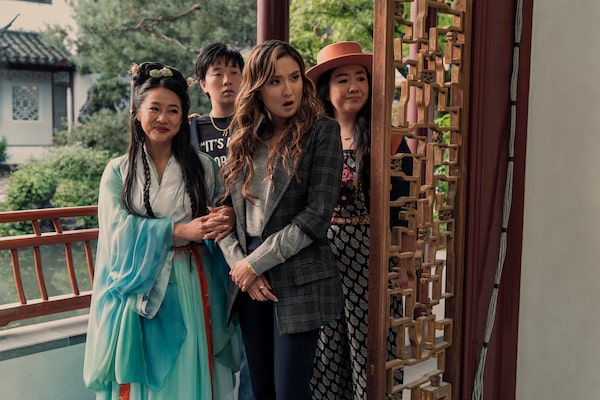
Joy Ride is a lewd road trip movie with a big, bursting heart, writes critic Barry Hertz.Ed Araquel/Lionsgate/lionsgate
Joy Ride
Directed by Adele Lim
Written by Cherry Chevapravatdumrong and Teresa Hsiao
Starring Ashley Park, Sherry Cola and Stephanie Hsu
Classification 18A; 95 minutes
Opens in theatres July 7
Critic’s Pick
Apparently, this summer movie season marks the return of raunch.
In-between the superheroes and superspies, studios are pushing lower-budget hard-R comedies that theoretically hearken back to the shock-and-raw days when Judd Apatow and his minions ruled the box-office like it was their own private sausage party. So far, though, we’ve had one flaccid-on-delivery contender (the Jennifer Lawrence-led No Hard Feelings), and the jury is still out on whether August’s Strays (featuring talkin’ dogs doin’ dirty deeds) will be as uproariously vulgar as its trailer. But that’s okay, because this weekend’s big new comedy Joy Ride is as fantastically filthy as they come, providing enough glorious gags about gagging to carry audiences through the cold, hard winter to come.
A road-trip movie that’s universal in its comedic appeal but specific in its cultural touchstones, the feature directorial debut of Adele Lim (screenwriter of Crazy Rich Asians) follows two best friends, serious lawyer Audrey (Ashley Park) and her wannabe artist best friend Lolo (Sherry Cola). The pair have been close since childhood, bonding as the only two Chinese kids in their Washington State town, but Audrey’s professional ambitions are threatening to divide the two. The pair find an opportunity to maintain their bond, though, when Audrey is sent by her firm on a business trip to Beijing in order to sign a rich new client, with Lolo coming along as her translator. (Audrey was adopted as a child by white parents, and has only a Duolingo-level understanding of basic Mandarin.)
Added to the mix last-minute is Lolo’s socially awkward non-binary cousin Deadeye (Sabrina Wu), while Audrey’s wild roommate from college, a now-famous Chinese actress named Kat (Stephanie Hsu), joins the trio once they’ve arrived. To think about it in Superbad terms, Audrey is Michael Cera, Lolo is Jonah Hill, Kat is sorta Emma Stone, and Deadeye is 100-per-cent McLovin. This isn’t as crass a comparison as it might seem, given that Joy Ride was developed under the stoned red-eyes of producers Seth Rogen and Evan Goldberg. (Their presence is also felt in the stylized end credits, which bizarrely feature Hebrew letters popping up alongside Mandarin.)
Once the quartet of friends get involved in a loopy scheme to track down Audrey’s birth mother, Lim’s film invents one messy scenario after the other, each an excuse to unleash a torrent of sex, drug and bodily fluid jokes. Not every bit lands, but they arrive so quickly and are delivered with such energizing commitment that it doesn’t matter much. And a good number of set-pieces – including one scene in which the friends are coerced into helping an antsy drug dealer evade the authorities by any means necessary – will leave audiences howling so loud that they’ll drown out whatever dialogue comes next.
Like Superbad – or any of the better R-rated comedies of the past few decades – Joy Ride operates with as lewd a mind as it does a big, bursting heart. The ridiculousness of the story, and the occasional sloppiness of the pacing, works because Lim and her two writers (Family Guy veterans Cherry Chevapravatdumrong and Teresa Hsiao) ensure that the film is driven by warm, relatable characters who you actually care whether or not they get that last smuggled condom of cocaine out of their buttholes.
So there’s that, but Joy Ride also boasts a genuinely fresh approach to race and sex that goes beyond the influence of Apatow and his ilk. First, there are the ways in which Lim explores, and toys around, with Western conceptions of Chinese culture, including a third-act turn that pushes the film into surprisingly challenging territory when it comes to questions of ethnicity. Not every audience will clock the specifics, but there is an authenticity here that levels up every narrative thread, performance and punchline.
Far easier to notice, though, is Joy Ride’s welcome devotion to making women the focus of their own sexual adventures. The male gaze is absent here, unless you count the concussed perspective of two boy-toy hunks whose heads are accidentally knocked together by one of our leading ladies during a riotous threesome scene. Between Joy Ride and this fall’s upcoming Zendaya drama Challengers, 2023 is shaping up to be the year of the so-called “devil’s three-way.” Maybe Strays will make it a true three-is-a-trend movement. But if Joy Ride makes it a one-and-done R-rated summer worth howling about, that’s fine, too.
 Barry Hertz
Barry Hertz